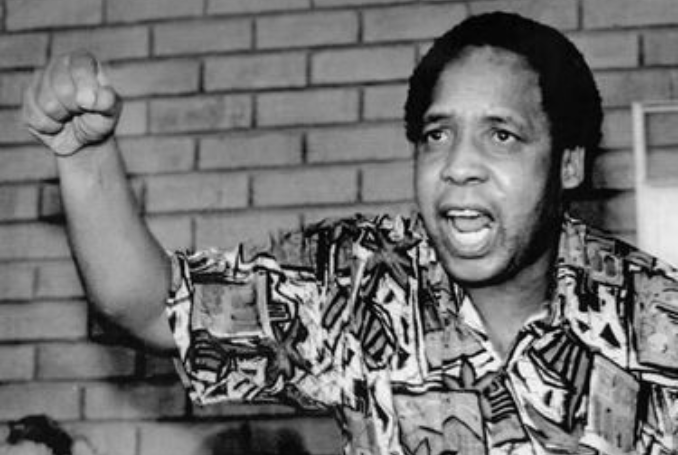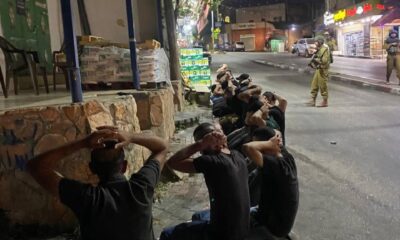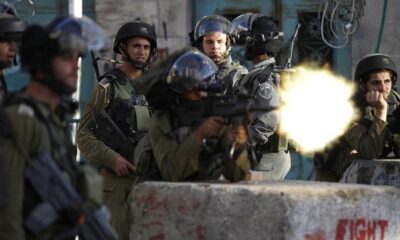Palestine
‘Fight for Socialism to Defeat Barbarism’: 30 Years since the Assassination of Chris Hani

If we believe Chris Hani represented the future of the country, did the assassins murder the future? With South Africa and the once powerful African National Congress (ANC) in dire straits – soaring poverty, unemployment, disorder, corruption, and crime – can the situation be salvaged by learning from his legacy and remedying the calamitous mess.
In assessing his legacy, we need to consider what the trajectory of such a life might have been; and what we possibly could have become and still can become – notwithstanding the considerable problems our country and liberation movement face.
In the immediate aftermath of the termination of Chris Hani’s life, the plans of those who plotted his assassination were thwarted. Mandela and the movement Hani gave his life for, steadied the situation, prevented the country from descending into chaos, kept negotiations on track, and saw political victory in the April 1994 national elections. Conventional wisdom at that stage was that the future was promising.
Without doubt, Chris Hani was committed to that path to initial political power, and would have celebrated the breakthrough. He would, however, have warned – as he had – about the danger of a revolution being waylaid by appeasement with capitalism and capture by opportunists of all stripes. He was focused on arming the forces of socialism for battles ahead.
Regarded as a likely successor to Mandela as ANC leader he made it clear in 1991, when he became general secretary of the South African Communist Party (SACP) – a major turning point in his short life – that his choice instead was to build a strong and independent party representing the interests of the workers and the poor, with a socialist society as the objective.
I do not believe Mandela, on becoming the country’s president, would have succeeded in altering that resolve. Mandela would have been reassured by Hani’s intention to work with the ANC and COSATU for the attainment of a National Democratic Revolution (NDR) – and the necessity of fundamental socio-economic change.
Imagining that Mandela would have felt ‘reassured’ does not preclude the assumption that he would naively have expected Hani to acquiesce with unpopular decisions of the government.
Chris Hani had ticked the boxes concerning the initial phase of transition and the communist alliance with the ANC-led national liberation movement: his support for the negotiations; the importance of building an open, democratic society; fostering a culture in the government of service to the people and accountability; building organs of civil society; the need for economic growth and foreign investment; the toleration of opposing views; an assertiveness that the movement needed to keep close to the people; his trustworthiness, and discipline of character.
Disagreement, possibly outrage, would have flared with the move from the ANC Government’s social-democratic Reconstruction and Development Programme (RDP) to the Growth, Employment and Redistribution (GEAR) economic trajectory in 1996, and the abysmal lack of consultation involved, that enforced the retrogressive change. Many have referred to this as a betrayal.
The SACP proved highly critical of that change, as is well known, correctly perceiving it as embracing the neo-liberal global free market economy – leading to Mandela berating Hani’s successors in no uncertain terms. Chris would have been to the forefront in opposing GEAR. The rift widened when Thabo Mbeki, Mandela’s deputy, regarded as the chief proponent of the policy, became president. The latter’s AIDS denialism would have certainly met with unmitigated hostility from Hani, who in that respect would have been of the same mindset as Mandela.
At such a point, I believe, Chris Hani would have toughened the Party’s stance and upped the ante; reinforced the militancy and unity of the trade unions; rallied the quiescent left within the ANC; stressed the vital need for revolutionary political education and analysis that was regressing in the movement; re-drawn the battle lines.
I like to imagine, polishing my crystal ball, that Chris Hani by then would have meaningfully strengthened the SACP; deepened its alliance with the trade unions; motivated the broad masses, women, and youth formations; revived the spirit of the Mass Democratic Movement (MDM) and aroused the creativity of the masses of our people, and particularly of labor – in a sharpening class war.
From the mid-1980s to 1994, the country witnessed an unprecedented and rising tide of insurrectionary fervor and organization, which, with other pillars of the struggle such as armed actions and international solidarity, led to the demise of apartheid. The working class organization, unity, and consciousness was at an all-time high. From that base and constituency, it should not be impossible to imagine a radical transformation, had Hani lived – and what might have been.
Would he have been at odds with Thabo Mbeki? Would Mandela and Mbeki have persisted with the GEAR trajectory had there been powerful mass resistance? Could they have been jolted in a left-leaning direction? We can only surmise.
Ironically, despite the unpopularity of GEAR, the ANC under Mbeki’s presidency, was victorious in the 1999 national elections, and again in 2004. That, however, proved ephemeral. Mbeki, was soon displaced by his rival Jacob Zuma.
Unlike the SACP’s misjudgment at the time, Hani would never have supported Jacob Zuma at the ANC’s Polokwane Conference in 2007, and his becoming president of the country. I am sure of that. He knew Zuma’s weaknesses from exile.
More pertinent, Zuma’s descent into corruption and his infamous rape trial in 2006, would have seen Chris Hani as an implacable foe and champion of revolutionary morality. Undoubtedly, he would have unreservedly condemned Zuma.
Given Hani’s political morality, it is not difficult to Imagine what a bulwark such mass-led leadership would have meant for the ANC and the country. But all this is conjecture – some might say the fantasies of Red Ronnie?
Dare we dream of such a scenario possible? We saw the overthrow of the apartheid system – once thought an impossibility. We have seen the power of revolutionary change throughout history;
the complexities of triumphs, defeats, and recovery.
The hour of crisis has now arrived for South Africa. Will the adage ‘Cometh the hour, cometh the leader’ hold true? Only the concrete conditions of the historic conjuncture, intersected by the efforts of reliable leadership, democratic organization, and people’s mass involvement, can determine our future. Out of crisis, and concrete conditions, emerging opportunity and leadership.
Chris Hani would tell us not to believe in a superman. Along with Mandela he often stated, that the masses make history, not kings and queens, generals and presidents. Nevertheless, as Marxism teaches, the leadership of an outstanding personality can be decisive: as was the case with Lenin, Fidel Castro, Ho Chi Minh, Nelson Mandela – decisive historical actors rooted within the masses.
To turn from conjecture to reality, requires learning from the life and legacy of those such as Chris Hani. To understand how he won the trust and confidence of the masses, and to understand why people were prepared to follow him, is to appreciate his qualities. These involved adherence to high principles and revolutionary morality: self-sacrifice and courage; an unwavering commitment to the interests of the people; talking their language and maintaining close ties with them; exposing lies and deceit and fighting for the truth; dedication to international solidarity and the struggle for a better world; unity of theory and action; proclaiming the goals of socialism.
Chris Hani, and the collective leadership he belonged to, proclaimed they were products of the struggle. They were making it clear that they saw the source of strength in the masses, and particularly the working class, as a conscious,
politically aware social force. That political consciousness does not come out of the blue or automatically as a product of the struggle. It requires sustained study, education, robust debate: mastering Marxist theory and applying the lessons in practical application. Practice without theory is blind – theory without practice is fruitless. Unfortunately, the intellectual level in the liberation movement, and particularly the ANC, has been neglected, and for reasons such as opportunism, narcissism and careerism, is probably at an all- time low.
To change the trajectory for meaningful democracy, to rescue South Africa from crisis and disorder, is to work among the masses of the people as Chris Hani, and so many others have done, for socio-economic freedom, equality and a just, socialist society for all.
The way out of the crisis cannot take the form of populism, spontaneity, or elitist change from above. It is only achievable by working with the people from the grassroots up, in communities and workplaces, to overcome the myriad problems we face, in a protracted process of organization and struggle.
This encompasses learning and teaching; raising awareness; achieving clarity of thought; building a principled collective leadership in the furnace of mass struggle, from which genuine leaders will emerge again providing revolutionary leadership. Revolutionary ideas when grasped by the masses become a material force for change.
This is to unlock the creative energy and political consciousness of our people – after years of neglect and diversion – based on freeing and uplifting the working people and the poor who suffer the most; the major forces of decisive change for the benefit of all.
To follow in Chris Hani’s footsteps, as history demands, means negating the assassins’ foul deeds. That is if we manage to re-calibrate and regain the path to the socialist future he was building. Fight for socialism to defeat barbarism. That is the best way to honor his life.








